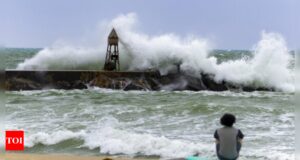Uncontacted hunter-gatherers in Indonesia “are facing a severe and immediate threat of genocide” because of mining for minerals on their lands for use in electric vehicles, a report claims.
In their own language, the Indigenous Hongana Manyawa people, of Halmahera island, call themselves “the people of the forest”. But their forest home is being destroyed in a rush for nickel, a crucial component in rechargeable batteries, campaigners say.
Of the approximately 3,500 Hongana Manyawa on Halmahera, about 500 remain uncontacted, according to Survival International. Nickel miners now operate on about 40% of the land of the people they say are living in voluntary isolation.
“The Halmahera nickel rush, driven by global demand for supposedly environmentally friendly electric vehicles, is creating a growing crisis on the territory of the uncontacted Hongana Manyawa,” the NGO’s report says.
“Survival International is calling for the urgent, immediate recognition and demarcation of their territory, an end to mining on this territory and the establishment of a ‘no-go zone’ as the only way to ensure the survival of the uncontacted Hongana Manyawa people.”
The situation in Halmahera is just one of a number of environmental disputes developing across the world about the extraction of minerals regarded as critical for the transition to low-carbon energy.
From lithium extraction in Serbia and Argentina, to cobalt mining in Congo, communities fear ecological destruction as a result of the increase in demand for minerals for high-capacity batteries, wind turbines and solar panels.
At least 19 companies are operating on the territory of uncontacted Hongana Manyawa, says Survival International. But the largest operation is the PT Weda Bay Nickel (PT WBN) mine, owned by the French miner Eramet, Survival International says.
It adds that Eramet has known of the risks to the uncontacted people living near its mine since 2013, but pressed ahead with development of the mine anyway.
Since then, videos have emerged that the NGO says show tribespeople resisting bulldozers operating in their territory, or being forced out of the increasingly denuded forest into mining camps to beg for food.
A spokesperson for Eramet has disputed the claims made by Survival International, saying some Hongana Manyawa had been “in regular and voluntary contact” with workers from the Weda Bay mine.
The spokesperson said that studies carried out by the mine had found no evidence that any of the Indigenous people living in or close to its concession were in voluntary isolation. In any case, a protocol had been imposed governing workers’ interactions with the community.
after newsletter promotion
“Under this protocol, when contact is initiated by these groups or inadvertently, PT WBN employees are required to adopt culturally appropriate behaviour,” the spokesperson said.
The campaigners say the deforestation and pollution caused by mining is destroying the rainforest the hunter-gatherers live off, and their increasing proximity to outsiders puts them at risk of contracting diseases to which they have no prior immunity.
“International experts on uncontacted Indigenous peoples, on disease, and on genocide have all warned that this mining poses an immediate threat of the devastating population collapse of the uncontacted Hongana Manyawa, that is, a genocide,” the report says.
By continuing with the mining, Eramet and other companies could be breaking international law, claims Survival International. It says that the lawfulness of any such developments rely on free, prior and informed consent from the people living on the land – consent the Hongana Manyawa are unable to give.
Eramet’s spokesperson said the company had listened to Survival International’s concerns in two exchanges with their activists and had taken additional precautionary measures as a result. “We would like to reiterate Eramet’s commitment to international human rights standards, including the United Nations guiding principles,” they said.
“We have established strict standards and require them to be applied by all our employees and contractors, in all our areas of operation. Our group is also voluntarily committed to the highest international mining standard [the initiative for responsible mining assurance].”




